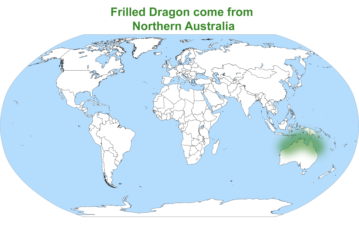Frilled Dragons
Reptilarium Animals
Frilled Dragons
Conservation status (Least Concern)
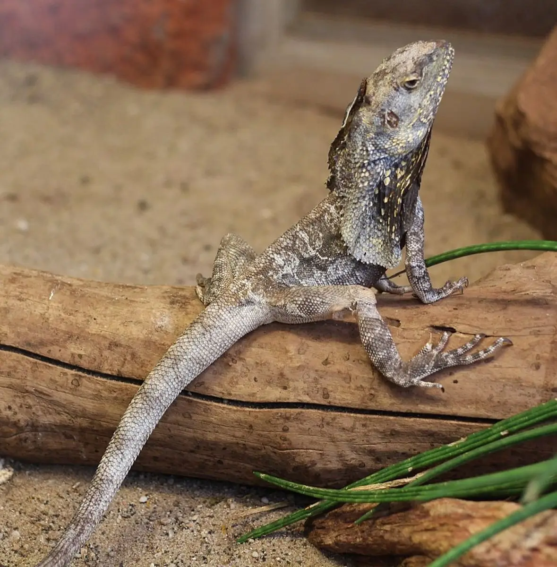

The frilled lizard (Chlamydosaurus kingii ), also known commonly as the frill-necked lizard, frilled dragon or frilled agama, is a species of lizard in the family Agamidae. It is endemic to northern Australia and southern New Guinea. This species is the only member of the genus Chlamydosaurus.
Its common names come from the large frill around its neck, which usually stays folded against the lizard's body. C. kingii is largely arboreal, spending the majority of its time in the trees. Its diet consists mainly of insects and small vertebrates. Frill-necked lizards, or 'frillies' as some call them, will occasionally eat plants as well, although this behaviour is uncommon. It is a relatively large lizard, averaging 85 cm (2.79 ft) in total length (including tail) and is kept as an exotic pet.
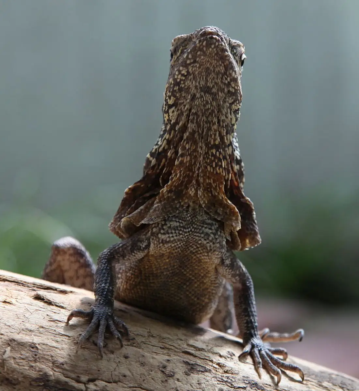
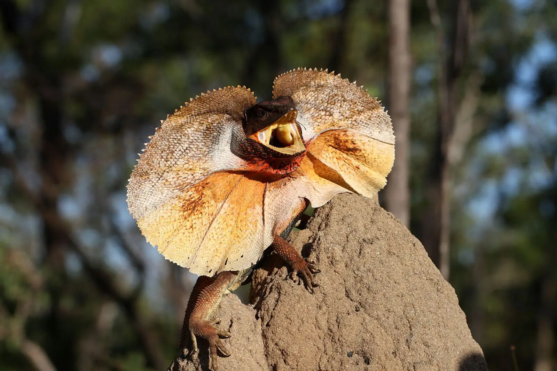
This reptile is the largest species of dragon family of lizards in Australia. The Frilled-neck lizard is called due to its frill (ruff) - a fold of skin, surrounding its throat. The frill of the lizard is thin and extensive, usually lying folded up over the lizard's shoulders. When the animal is threatened or alarmed, the frill extends, rising abruptly. The colour of their skin varies depending on the environment, often matching tree bark, which makes the animal extremely difficult to detect. The mouth lining and tongue of the animal are yellow or pink. The Frilled-neck lizards have faint, dark grey stripe on the tip of their tails.
The Frilled-neck lizard is arboreal, spending its time on trunks and branches of trees. This reptile prefers humid climate, usually being found in tropical Savannah woodlands. The area of their range includes northern parts of Australia as well as southern New Guinea.
As many of their relatives, these lizards are carnivores (insectivores). They primarily feed upon insects such as moths and butterflies as well as consume beetles, termites and cicadas. They will also eat spiders, mice and even, other lizards.
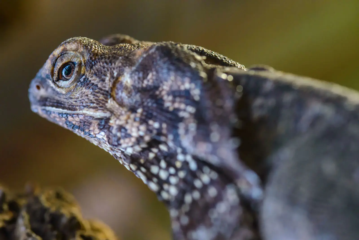
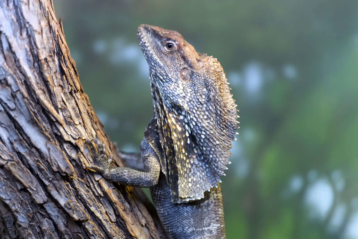
The Frilled lizard is a solitary hunter. This lizard is an arboreal animal, spending most of its time quietly camouflaged on trees and coming down only at sunrise and sunset in order to feed or mate. The Frilled-neck lizard is a very territorial animal. When threatened, the frill extends, intimidating the rival and making the lizard look much larger than it is. In addition, they use the frill as a mean of communication. These lizards are most active by day while in the morning, they are often seen sunbathing. When sunbathing, the frill of the lizard extends, allowing the animal to get large amount of heat in a short amount of time. When finished, the lizard climbs back onto the tree. Being cold-blooded animal, this reptile has to maintain its body temperature at a suitable level.
Fun Facts for Kids
- The skin of this animal is scaled, helping the lizard reduce water loss in a dry environment.
- The teeth and jaws of Frilled-neck lizard are fused together.
- The frill plays a key role in their lives. Not only is it important in intimidating a rival, but it also helps the animal regulate the body temperature and find a mate.
- The frill of lizards, found in Queensland, is bright yellow with black markings whereas in northern Australia and New Guinea, these lizards have an orange or red frill.
- They possess cartilaginous spines, connected with jaw bones, helping them keep the erected frill stable.
- When threatened, the lizard raises its forelegs to look larger, extends the frill, opens the mouth and starts hissing. Otherwise, the animal simply runs away, climbing the nearest tree.
- They use bi-pedalism - a form of locomotion, where the animal runs upright, using only its hind legs.
- Until 1991, this animal has been featuring the Australian two-cent coin.

